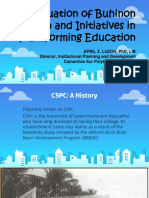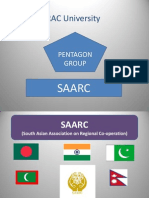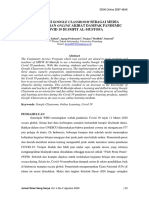100%(1)100% found this document useful (1 vote)
597 viewsProgram Learning Outcomes
The document outlines the program learning outcomes for graduates of the Bachelor in Public Administration program at Camarines Sur Polytechnic Colleges in the Philippines. The outcomes include developing knowledge of good governance, appreciating the challenges of public service, cultivating high ethical values, promoting public interest, acquiring managerial skills, and exhibiting research abilities. A curriculum map is then presented matching the program courses to each of the learning outcomes.
Uploaded by
Vktoria HalenCopyright
© © All Rights Reserved
Available Formats
Download as DOCX, PDF, TXT or read online on Scribd
100%(1)100% found this document useful (1 vote)
597 viewsProgram Learning Outcomes
The document outlines the program learning outcomes for graduates of the Bachelor in Public Administration program at Camarines Sur Polytechnic Colleges in the Philippines. The outcomes include developing knowledge of good governance, appreciating the challenges of public service, cultivating high ethical values, promoting public interest, acquiring managerial skills, and exhibiting research abilities. A curriculum map is then presented matching the program courses to each of the learning outcomes.
Uploaded by
Vktoria HalenCopyright
© © All Rights Reserved
Available Formats
Download as DOCX, PDF, TXT or read online on Scribd
You are on page 1/ 2
Republic of the Philippines
CAMARINES SUR POLYTECHNIC COLLEGES
Nabua,Camarines Sur
COLLEGE OF EDUCATION, ARTS AND SCIENCE
PROGRAM LEARNING OUTCOMES
Bachelor in Public Administration
The graduates of Bachelor in Public Administration (BPA) are intended to:
1. Develop adequate knowledge and understanding of fundamentals of good governance
2. Attain high appreciation for the demands and challenges of public service;
3. Cultivate high ethical values for public service, accountability, nationalism and
sustainability
4. Develop strong sense of duty to promote and protect public interest especially for the
depressed and the marginalized communities;
5. Acquire adequate skills in managerial including planning implementation, monitoring
and human, materials and resource management for government and civil society
organizations;
6. Exhibit adequate ability to engage in scientific research and national decision-making
Republic of the Philippines
CAMARINES SUR POLYTECHNIC COLLEGES
Nabua,Camarines Sur
COLLEGE OF EDUCATION, ARTS AND SCIENCE
CURRICULUM MAP FOR PUBLIC ADMINISTRATION
OUTCOMES Knowledge Demands High Promotion Skills in Scientific
in Good and Ethical and managerial research
Governance challenges values for protection and and
of public public of public supervisory national
service service interest functions decision
making
Public Administration Courses:
Introduction to Public L L L L L L
Administration
Phil Administrative Thought L L L L L L
and Institutions
Ethics and Accountability in L L L L L O
the Public Service
Governance and Development L L L O O O
Knowledge Management and P P P P O O
ICT for PA
Leadership and Decision L L L L O O
Making
Local and Regional L L L L P P
Governance
Public Personnel L L L L L O
Administration
Human Behavior in L L L P P P
Organization
Public Fiscal Administration L L L L O O
Public Accounting and L L L L P O
Budgeting
Organization and Management L L L L P O
Office and System L L L L P O
Management
Public Policy and Program L L L L P O
Administration
Administrative Law L L L L P O
Politics and Administration L L L L P O
Special Topics for PA L L L P O O
Special Core
Basic Accounting O O O O O O
Inferential Statistics O O O O O O
Psychology in Governance L L L L L L
Corporate Governance and L L L L L O
Social Responsibility
Electives L L O O O O
Practicum L L L L L L
Research Methods / Thesis L L O O O O
L – whether subject course facilitates learning of the competency
(input is provided and competency is evaluated)
P – whether subject course allows student to practice competency
(no input but competency is evaluated)
O – whether subject is an opportunity for development
(no input nor evaluation, but competency is practiced)
You might also like
- Module PUAD 102 - Philippine Administrative Thoughts and InstitutionsNo ratings yetModule PUAD 102 - Philippine Administrative Thoughts and Institutions70 pages
- National College of Public Administration and GovernanceNo ratings yetNational College of Public Administration and Governance8 pages
- Feasibility Study For The Proposed Bachelor of Public Administration100% (3)Feasibility Study For The Proposed Bachelor of Public Administration5 pages
- A Proposed Training Design For Barangay Officials90% (10)A Proposed Training Design For Barangay Officials5 pages
- A Proposed Training Design For Barangay Officials90% (10)A Proposed Training Design For Barangay Officials5 pages
- Obe Syllabus Mpa 502 Management Planning ControlNo ratings yetObe Syllabus Mpa 502 Management Planning Control5 pages
- Mpa 205 E-Governance in Public Administration Syllabus - Dr. .Matildo.fNo ratings yetMpa 205 E-Governance in Public Administration Syllabus - Dr. .Matildo.f12 pages
- CHED CMO On Bachelor of Science in Entrepreneurship100% (3)CHED CMO On Bachelor of Science in Entrepreneurship34 pages
- Syllabus in Special Topics in Public Administration100% (4)Syllabus in Special Topics in Public Administration8 pages
- Syllabus in PA 114 - Politics and Administration100% (6)Syllabus in PA 114 - Politics and Administration9 pages
- Fetalver ABPA3 (PA 317 Public Accounting and Budgeting) PDFNo ratings yetFetalver ABPA3 (PA 317 Public Accounting and Budgeting) PDF38 pages
- Republic of The Philippines Benguet State University College of Public Administration and Governance La Trinidad, BenguetNo ratings yetRepublic of The Philippines Benguet State University College of Public Administration and Governance La Trinidad, Benguet9 pages
- Public-Policy-And-Program-Management SYLLABUS100% (3)Public-Policy-And-Program-Management SYLLABUS2 pages
- Syllabus Grad SCH Public Fiscal Administration100% (10)Syllabus Grad SCH Public Fiscal Administration3 pages
- Philippine Administrative Thoughts and Institution Module 175% (4)Philippine Administrative Thoughts and Institution Module 11 page
- A Proposed Training Design For Barangay Officials100% (2)A Proposed Training Design For Barangay Officials25 pages
- Bpa 101 Introduction To Public Administration SyllabusNo ratings yetBpa 101 Introduction To Public Administration Syllabus8 pages
- Course Syllabus - Ethics and Accountability in Govt100% (2)Course Syllabus - Ethics and Accountability in Govt4 pages
- Laguna State Polytechnic University: Course: Pa 503 Public Personnel Administration Semester 2nd SEM 2020-2021No ratings yetLaguna State Polytechnic University: Course: Pa 503 Public Personnel Administration Semester 2nd SEM 2020-20218 pages
- Public-Fiscal-Admin Syllabus DrLMVicencio FinalNo ratings yetPublic-Fiscal-Admin Syllabus DrLMVicencio Final8 pages
- Pa 103 Philippine Administrative Thoughts and Institutions Syllabus Moraca Maria Michelle C100% (1)Pa 103 Philippine Administrative Thoughts and Institutions Syllabus Moraca Maria Michelle C12 pages
- Course Outline Ethics and Accountability in Public ServiceNo ratings yetCourse Outline Ethics and Accountability in Public Service2 pages
- Mpa 205 Local Govt and Regl Admin Syllabus100% (1)Mpa 205 Local Govt and Regl Admin Syllabus12 pages
- PA2-Phil. Admin. Thought and Inst. Syllabus100% (2)PA2-Phil. Admin. Thought and Inst. Syllabus8 pages
- National Budget Circular No 589 Dated May 25 2022No ratings yetNational Budget Circular No 589 Dated May 25 202215 pages
- National College of Public Administration and Governance University of The PhilippinesNo ratings yetNational College of Public Administration and Governance University of The Philippines5 pages
- Recalibrated Syllabus PACC 13 Research Methods in Public Administration 2No ratings yetRecalibrated Syllabus PACC 13 Research Methods in Public Administration 26 pages
- Philippine Administrative System Course Outline0% (1)Philippine Administrative System Course Outline3 pages
- COMMISSION ON HIGHER EDUCATION Memorandum Orders 2011-2000No ratings yetCOMMISSION ON HIGHER EDUCATION Memorandum Orders 2011-200063 pages
- Module in Bpa 117 (Ethics and Accountability in The Public Service)100% (1)Module in Bpa 117 (Ethics and Accountability in The Public Service)27 pages
- Public Policy and Program Administration Syllabus100% (2)Public Policy and Program Administration Syllabus12 pages
- Enhanced Policies and Guidelines On Student Affairs PDF100% (3)Enhanced Policies and Guidelines On Student Affairs PDF65 pages
- PA211 - Public Administrative Thoughts and InstitutionsNo ratings yetPA211 - Public Administrative Thoughts and Institutions7 pages
- Hand Out 1 PA 298 Research Methods in Public Administration100% (1)Hand Out 1 PA 298 Research Methods in Public Administration11 pages
- Program Development Project Management Syllabus100% (2)Program Development Project Management Syllabus5 pages
- Template of University'S Innovative Program: Content Key Points Differences From Traditional Approaches100% (2)Template of University'S Innovative Program: Content Key Points Differences From Traditional Approaches2 pages
- BCC 2023 2024 1s Bspa 4 DC Governance and Development Syllabus100% (1)BCC 2023 2024 1s Bspa 4 DC Governance and Development Syllabus2 pages
- National Public Hearing Consultation On The Proposed Policies Standards and Guidelines For Bachelor of Science in Legal Management Program 2No ratings yetNational Public Hearing Consultation On The Proposed Policies Standards and Guidelines For Bachelor of Science in Legal Management Program 233 pages
- Institutional Capability Training-Workshop On The Implementation of Outcome-Based Education FrameworkNo ratings yetInstitutional Capability Training-Workshop On The Implementation of Outcome-Based Education Framework77 pages
- Buhi Campus Situationer and Initiatives 2No ratings yetBuhi Campus Situationer and Initiatives 236 pages
- Richard S. Lisano: Professional ExperienceNo ratings yetRichard S. Lisano: Professional Experience2 pages
- Lawyers' Committee For Civil Rights Under Law Open Letter To FacebookNo ratings yetLawyers' Committee For Civil Rights Under Law Open Letter To Facebook10 pages
- Impact of Corporate Social Responsibility On Firm's Corporate Image (A Case Study of Dangote PLC)100% (1)Impact of Corporate Social Responsibility On Firm's Corporate Image (A Case Study of Dangote PLC)16 pages
- Parallel Thinking: Guy Blelloch Carnegie Mellon UniversityNo ratings yetParallel Thinking: Guy Blelloch Carnegie Mellon University37 pages
- Global Education Policy - Networks and Flows - Stephen BallNo ratings yetGlobal Education Policy - Networks and Flows - Stephen Ball8 pages
- Sosialisasi Google Classroom Sebagai Media Pembelajaran Online Akibat Dampak Pandemic Covid 19 Di Smpit Al-MustofaNo ratings yetSosialisasi Google Classroom Sebagai Media Pembelajaran Online Akibat Dampak Pandemic Covid 19 Di Smpit Al-Mustofa14 pages
- Lawrence Erlbaum Associates The Handbook of Task Analysis For Human Computer InteractionNo ratings yetLawrence Erlbaum Associates The Handbook of Task Analysis For Human Computer Interaction667 pages
- A Journey Through The 13 Colonies Unit OverviewNo ratings yetA Journey Through The 13 Colonies Unit Overview6 pages
- Fiata: Application Form For The Fiata Diploma in Freight ForwardingNo ratings yetFiata: Application Form For The Fiata Diploma in Freight Forwarding3 pages
- School INSET Report Template SY 2023 2024No ratings yetSchool INSET Report Template SY 2023 20245 pages


















































































































